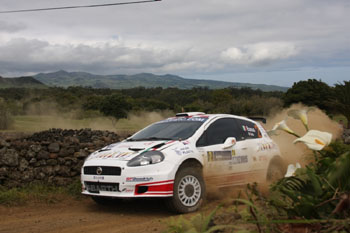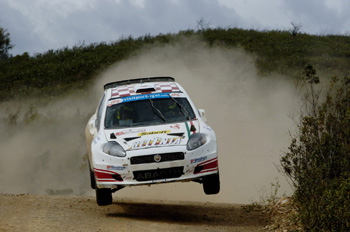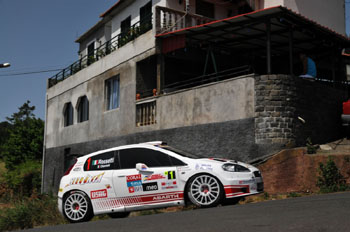

 |
|
Fiat currently competes in the
Intercontinental Rally Challenge (IRC)
though its Abarth division with the Super
2000-specification Grande Punto Abarth. |
|
|
|
It
is being reported that Abarth is on the brink of
signing up for the FIA World Rally Championship
next year a decision that would return the Fiat
Group to rallying's pinnacle after a sixteen
year absence.
In an interview
with the Financial Times yesterday Neil Duncanson, the Chief
Executive Officer of series rights owner North One, a
British television production company, said: "Iíve got one or two
[manufacturers] who I think will come in. I donít want more
than four [manufacturers] because any more than that and they canít win." Well
placed sources have revealed that the two manufacturers
eyeing up a step onto the world stage are Fiat and
Volkswagen.
Fiat currently
competes in the Intercontinental Rally Challenge (IRC)
though its Abarth division and the Super 2000-specification
Grande Punto Abarths, which will be in action this weekend
during the eighth round of the series, the 39th Barum Czech
Rally ZlŪn. A win last time out on the 50th Rali Vinho
Madeira has put Abarth's lead driver Giandomenico Basso back
into the fight for the drivers' title although the Scorpion
brand has long since given up any hopes of securing the
manufacturers' cup.
Fiat was a prime
mover behind the formation of the IRC (winning the inaugural
title in 2006 when the Grande Punto Abarth was badged as a
Fiat) which is backed by satellite television channel
Eurosport and, as well as Abarth, the IRC series sees
factory-supported cars from Skoda, Peugeot and Proton in
action. While VW has had little success in the World Rally
Championship in the past, the Fiat Group would be returning
to an arena where it has an amazing win laden history,
gained in particular through its Lancia brand which built
itself global reputation though an unprecedented winning
streak in the world series that netted nine manufacturers
titles, including six that came consecutively from 1987 to
1992. Fiat won the last of its three WRC titles in 1980.
A switch to the
WRC would be a surprise decision for Fiat as the series has
entered into a rapid decline in recent years. Poor promotion
and organisation, a lack of interest from the FIA,
spiralling costs and a calendar that takes in a swage of
events that are both irrelevant to manufacturers and that
have had their unique formats throttled, have all added up
to see the championship fade away from public interest. At
the end of last season Subaru and Suzuki quit the WRC
leaving just Ford and CitroŽn as manufacturers involved. The
most important event on the calendar, the Rallye Monte
Carlo, dumped the WRC at the end of 2008 to switch to the
IRC, and after a highly-successful first year in the IRC
when, free from the fetters of the WRC, it was able to
rekindle much of its traditional spirit. The prestigious
event has recently confirmed that it will also count for the
upstart series again in 2010.
With little in
interest being shown in the WRC from manufacturers and the
major expense of building cars to the regulations the series
has been forced to swallow its pride and take a close look
at the hugely successful new breed of lower-cost Super 2000
cars which combine a normally-aspirated 2.0 litre engine
with a stock four-wheel-drive transmission system and
limited electronic driver aids. On June 25 the FIA announced
that for 2010 it will form a "Super 2000 Cup" in the WRC
calendar for which teams will need to register and contest
at least seven events, with one of these being located
outside Europe. At the same time the FIA confirmed that the
introduction of the new generation of WRC machines will be
brought forward to 2011. These cars will feature a 1.6 litre
turbo engine and incorporate many aspects of the Super 2000
cars.
Despite the
extra costs of competing in the WRC compared to the IRC,
Duncanson sees the much lower costs of the WRC versus F1 as
being a strong factor in attracting manufacturers, as well
as the visual similarities between the rally cars and those
that sit in the showrooms. "The manufacturers find
themselves in a much better position because we are selling
the real cars," he told FT.
|